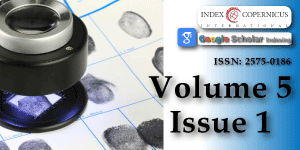An update on outpatient competence restoration outcomes: The Washington DC Model
Main Article Content
Abstract
This study provides an update to a previous study exploring time to restoration of adjudicative competence within an Outpatient Competence Restoration Program (OCRP). Authors examined the probability of restoration for individuals referred for outpatient competence restoration in the U.S. capital, and revisited the requirements of American Law, taking a closer look at how programmatic changes improve restoration and encourage adherence. Competence to stand trial remains a critical screening function of the judicial system to ensure that defendants have a basic understanding of courtroom procedures. Competency restoration is therefore an attempt to protect both the integrity of the system and the rights of defendants. Aggregate data from the OCRP’s previous four years of competence restoration efforts were reviewed for demographic characteristics, restoration rates, and time to restoration. Poisson regression modeling identified probability differences in restoration between sequential restoration periods. Since our initial analysis, the DC OCRP has been successful in restoring 97 of 345 participants (28.1%), with referral rates increasing from year to year. 39.2% are now restored after the 3rd round of competency restoration. Poisson regression modeling of individuals attaining competence during six successive restoration periods showed that differences for the first five rounds of restoration were not statistically significant (p = 0.418). In the 6th round, however, the difference in percentage of restored participants was statistically significant compared to previous rounds (irr = 0.32; p = 0.0001). We discuss the policy implications, especially those that suggest that the DC OCRP has improved its ability to restore competence beyond the 1st round of restoration.
Article Details
Copyright (c) 2021 Bell RN, et al.

This work is licensed under a Creative Commons Attribution 4.0 International License.
Dusky v. U.S., 362 U.S. 402. 1960.
Wik A, Hollen V, Fisher W. Assessment #9: Forensic patients in state psychiatric hospitals: 1999-2016. Alexandria, VA: National Association of State Mental Health Program Directors. 2017.
Felthous AR. Competence to stand trial should require rational understanding. Journal of the American Academy of Psychiatry and the Law. Florida Senate. (2010). Interim report 2011-106: Forensic hospital diversion pilot program. Tallahassee, FL: Florida Senate. 2011. https://www.flsenate.gov/UserContent/Session/2011/Publications/InterimReports/pdf/2011-106cf.pdf
Morris GH, Haroun AM, Naimark D. Assessing competency competently: toward a rational standard for competency-to-stand-trial assessments. J Am Acad Psychiatry Law. 2004; 32: 231-245. PubMed: https://pubmed.ncbi.nlm.nih.gov/15515910/
Riggs Romaine CL, Kemp K, DeMatteo D. Evaluation of juvenile competency to proceed: Applying the Dusky standard. J Foren Psychol Practice. 2010; 10: 1-12.
Heilbrun K, Rogers R, Otto RK. Forensic assessment. In Taking psychology and law into the twenty-first century. 2004; 119-146.
Mossman D, Bowen MD, Vanness DJ, Bienenfeld D, Correll T, et al. Quantifying the accuracy of forensic examiners in the absence of a “gold standard”. Law Hum Behav. 2010; 34: 402-417. PubMed: https://pubmed.ncbi.nlm.nih.gov/19771499/
Mossman D, Noffsinger SG, Ash P, Frierson RL, Gerbasi J, et al. AAPL practice guideline for the forensic psychiatric evaluation of competency to stand trial. J Am Acad Psychiatry Law. 2007; 35: S3-72. PubMed: https://pubmed.ncbi.nlm.nih.gov/18083992/
Warren JI, Murrie DC, Stejskal W, Colwell LH, Morris J, et al. Opinion formation in evaluating the adjudicative competence and restorability of criminal defendants: A review of 8,000 evaluations. Behav Sci Law. 2006; 24: 113-132. PubMed: https://pubmed.ncbi.nlm.nih.gov/16557643/
Miami-Dade Forensic Alternative Center Pilot Program Status Report. 2016.https://www.neomed.edu/wpcontent/uploads/CJCCOE_11_FACStatus.pdf
Wik A. Alternatives to inpatient competency restoration programs: Community-based competency restoration programs. Falls Church, VA: NRI. 2018. https://www.nri-inc.org/our-work/nri-reports/alternatives-to-inpatient-competency-restoration-programs-jail-based-competency-restoration-programs /
Danzer GS, Wheeler EMA, Alexander AA, Wasser TD. Competency restoration for adult defendants in different treatment environments.J Am Acad Psychiatry Law. 2019; 47: 68-81. PubMed: https://pubmed.ncbi.nlm.nih.gov/30737294/
American Psychological Association. American Psychological Association ethical principles of psychologists and code of conduct. Washington, DC. American Psychological Association. 2017.
American Psychological Association. Specialty guidelines for forensic psychology. Am Psychol. 2013; 68: 7-19. PubMed: https://pubmed.ncbi.nlm.nih.gov/23025747/
Cameron R, Flores-Ferrán N. Perseveration of subject expression across regional dialects of Spanish. Spanish in Context. 2004; 1: 41-65.
Hualde J. Spanish /i/ and related sounds: An exercise in phonemic analysis. Studies in the Linguistic Sciences. 1997; 27.
Johnson NR, Candilis PJ. Outpatient competency restoration: A model and outcomes. World J Psychiatry. 2015; 5: 228-233. PubMed: https://www.ncbi.nlm.nih.gov/pmc/articles/PMC4473494/

